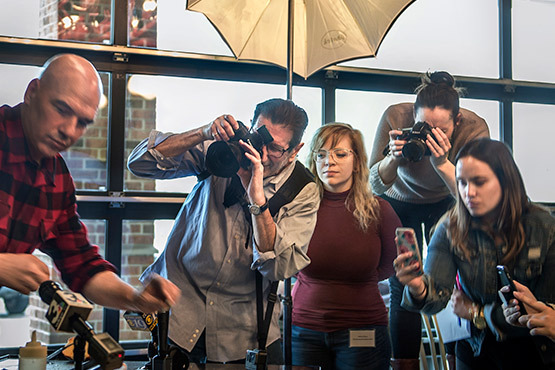
News . Feature Stories . Q&A with Mallory Chavez
News
March 26, 2018
Q&A with Mallory Chavez
'I have never felt more supported and uplifted by a group of people'

Chavez, center, assists Barney Taxel at a shoot for chef Michael Symon. Photo by Robert Muller/CIA
As a junior photography major, Mallory Chavez has some exhibition and job experience under her belt. As she gets closer to graduation, she’s honing her plans for her career as a professional photographer.
What’s an example of success that you’ve experienced in your CIA career?
Recently, I was extremely grateful to be accepted into CIA's SIE '72 [Student Independent Exhibition] as well as The Art of Giving exhibition at the Progressive Art Gallery in Cleveland. It's very exciting for me, because I have been so afraid to put myself out in the world. Now that I'm doing it, it's definitely still scary, but it's very rewarding to be in a gallery space and see viewers taking in what I've done.
What drew you to CIA?
I first visited CIA when I was a junior in high school after a college visit from Pita Brooks. During the presentation, my heart kept pounding from excitement, and I knew CIA was the school that would change my life. And I was right.
What’s your favorite part of making art?
My process. I enjoy the solitude of being within an environment and the inevitable connection that is made between photographer and landscape. It is not uncommon for me to spend hours on an image, constant revisions, and editing processes that are either rejected or accepted. I work predominantly in digital, and spend a lot of time using Photoshop after being on location for long periods of time, so I become very familiar with the subject and what I want to show the viewer.
Have you had any internships?
I am currently interning at Taxel Image Group for Barney Taxel. Barney is a commercial photographer who specializes in food, a subject that is very far from my comfort zone, which is why this internship is so valuable to me. I am learning the ins and outs of owning a photography business, as well as the trade secrets for different types of commercial photography.
Where would you like to be after you graduate from CIA?
I am hoping to continue showing in gallery spaces and continue having a studio practice. My dream is to have my own studio and to keep working with landscapes until I can find the true essence of the subject matter.
If you could give your younger self a piece of advice, what would it be?
I would tell myself to start investing more into my work, rather than trying to save every penny. I've always been conscious of money and I have been terrified to spend more than $10 on a piece of work. Somewhere in between sophomore and junior year, my whole outlook on my life changed. My priorities shifted, one of which was to spend more time and money on what I want my work to be about.
What has surprised you in your education at CIA?
The connections I have made with my professors and peers have surprised me the most at CIA. Photography is a very close department, and I have never felt more supported and uplifted by a group of people. My peers and professors inspire me every day to better myself and my work. They encourage me even when I feel like I can't get past something. I honestly feel like I have changed as a person, for the better, for having met my friends and the professors in the Photography + Video Department, and I am so grateful to be where I am right now.
What do you still struggle with in terms of making art?
I still struggle with a lot of different aspects of making art, but my biggest obstacle is telling myself that what I'm doing is meaningful. I make the work first and find the concept second, which sometimes makes it difficult for me to find the deeper meaning other than pretty pictures of landscapes.
What’s one thing that people are surprised to learn about you?
I had open heart surgery when I was 7 years old. The procedure was called a sub-aortic membrane resection, which means that I had a membrane growing in my aorta valve that was cutting off blood flow. For the first seven years of my life, my heart swished like windshield wipers in the rain. I also have Wolff-Parksinson-White Syndrome, which means that I have constant, but irregular heart palpitations that occur either when I'm active or at rest. I could be editing an image and my heart will start racing like I just swam the 100mm freestyle. While these issues can be troublesome, I don't let them hold me back, and they remind me that I was given a second chance a life when I was 7 years old and I need to give back to the world.
Latest Headlines view all
-
April 02, 2024
Cleveland Institute of Art students partner with Progressive Art Collection to exhibit Ready, Set, Relay! -
March 04, 2024
Cleveland Institute of Art announces Curlee Raven Holton Inclusion Scholar Program -
November 06, 2023
Collision of art and artificial intelligence creates murky waters for artists, curators and educators
Questions?
For more information about this or other CIA news, contact us here.
Social Feed